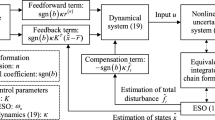Abstract
A novel adaptive disturbance rejection control scheme for a linear time varying (LTV) system from the perspective of differential algebraic framework is proposed. A numerical differentiator is used to obtain the derivative estimates from the system output, which contain overall dynamics of the system. Combining a local modeling technique and conventional proportional integral differential controller, the proposed control scheme perfectly accommodates disturbances and measurement noises. The convincing simulations validate the proposed control scheme well.
Access this chapter
Tax calculation will be finalised at checkout
Purchases are for personal use only
Similar content being viewed by others
References
Marinescu B (2010) Output feedback pole placement for linear time-varying systems with application to the control of nonlinear systems. Automatica 46:1524–1530
Huang R (2007) Output feedback tracking control of nonlinear time-varying systems by trajectory linearization. Russ college of engineering and technology. PhD Thesis, Ohio University
Marino R, Tomei P (2003) Adaptive control of linear time-varying systems. Automatica 39:651–659
Fliess M, Sira-Ram H (2004) Control via state estimations of some nonlinear systems. In: Proceedings 6th IFAC symposium on nonlinear control systems(NOLCOS 2004), Stuttgart,Germany
Fliess M, Join CE, Sira-Ramírez H (2008) Non-linear estimation is easy. IJMIC 4:1–6
Mboup M, Join CE, Fliess M (2007) A revised look at numerical differentiation with an application to nonlinear feedback control. In: 2007 mediterranean conference on control and automation Athens, Greece
Mboup M, Join CE, Fliess M (2009) Numerical differentiation with annihilators in noisy environment. Numer Algorithms 50(4):1–27
Author information
Authors and Affiliations
Corresponding author
Editor information
Editors and Affiliations
Rights and permissions
Copyright information
© 2012 Springer Science+Business Media B.V.
About this paper
Cite this paper
Zhao, D., Wang, Z., Wang, Y., Hu, W. (2012). Adaptive Disturbance Rejection Control of Linear Time Varying System. In: He, X., Hua, E., Lin, Y., Liu, X. (eds) Computer, Informatics, Cybernetics and Applications. Lecture Notes in Electrical Engineering, vol 107. Springer, Dordrecht. https://doi.org/10.1007/978-94-007-1839-5_81
Download citation
DOI: https://doi.org/10.1007/978-94-007-1839-5_81
Published:
Publisher Name: Springer, Dordrecht
Print ISBN: 978-94-007-1838-8
Online ISBN: 978-94-007-1839-5
eBook Packages: EngineeringEngineering (R0)



